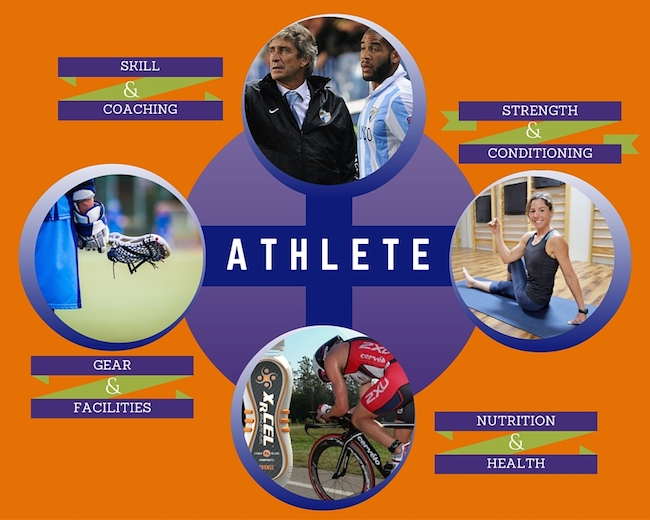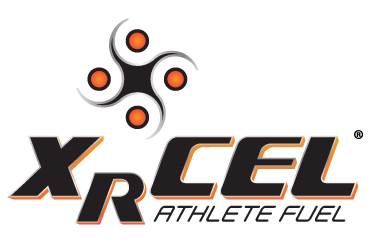
04 Feb Essential Elements for Great Athletic Performance
Like most things in life, being great at something and consistently getting great results takes work. It’s no different in athletics; athletes are not born great they work hard to become great. Now with that said, there are several factors that contribute along the way to being good and great at your sport; Talent, Strength & Conditioning, Equipment & Facilities, and Nutrition. We like to think of these factors as major points on a compass, each helping to guide the athlete along their way to improvement and ultimately really great performance.
The first point on our compass, deals with talent, skill for the sport and coaching. In part it factors in genetics and an individuals lineage as it relates to a particular sport or athleticism in general, but mostly this compass point relates to the development of sport specific abilities, knowledge, and finely tuned techniques for superior play and or competitive performance. These “talents” develop over time and if properly cultivated become ingrained and are ready for application on the day of competition. They are continuously evolving factor and certainly ones that need to be considered well before you are competition ready.
Moving along our compass, strength & conditioning is the next critical factor. Strength & conditioning, like talent & skill, is foundational. It drives size, speed, agility, and all other physical attributes associated with the sport. It too, is developed over time and treated as a preparatory factor for competition.
Along with strength & condition, equipment & facilities play an important role in ones performance both in training and during completion. Having access to the best possible equipment, be it the best running shoes or soccer cleats, the lightest bike, the most streamlined helmet, and even the field surface to train and compete on, all make a difference in an athlete’s performance potential. The equipment and facilities are tools for the athlete to use to get better and perform their best, and like the two compass point factors discussed previously come into play well before competition day.
Our last compass point, involves nutrition. Certainly it begins with a well balanced diet including the appropriate ratios of protein, fats, and carbohydrates, plus water for proper hydration.
Here is where this compass point, in our opinion, differs from the other three. You see the other three points or factors involve activities and decision taken well in advance of the day of competition. No one goes into a game or race day without having practiced, or without having tried out their new bike or broken in their running shoes or soccer boots. They come to competition day with ingrained skills, the best possible physical condition, and the best possible equipment they can afford. They are like a fine racecar tuned and ready to go, needing only to be fueled and driven.
Unfortunately, it is this last factor that is often times neglected. All of the preparatory work an athlete does in advance of competition can be wasted if they have not properly considered their nutrition and hydration needs for their event.
Too often we hear “having a well balanced diet is all my athletes need”. We agree in part, yes athletes need a well balanced diet. It is the foundation of their well-being and is particularly important in maintaining their condition given the extra stresses they expose their body to.
Having a well balanced diet is however not enough. Athletes in training and competition burn a tremendous amount of energy and produce large quantities of sweat during these sessions. Properly planning for and providing hydration, electrolyte needs, and importantly caloric needs during training and competition is perhaps the single most important “day-of” activity an athlete can consider.
Everything else has been previously considered, but not being properly fueled for the duration of an event separates those in the win column and on the podium from the losers and also ran’s. Managing ones fuel and hydration is critical and the timing of the same can make the difference between success and failure. Relying on only a pre-event meal, which often occurs, 3-4 hours in advance of the competition may not be enough when you consider you are still burning calories within that 3-4 hour window and may be increasing your caloric burn rate during warm-ups and through nervous energy, thus emptying the fuel tank you just filled up leaving only a portion to rely on during the competition.
Here is where athletes need to carefully consider how to properly and effectively replenish their fuel reserves immediately before and during competition to achieve the best performance. Because energy is most efficiently created by carbohydrates they are the best choice of fuel for athletes. Choosing the right carbohydrate is also important because they are not all the same and require different processes within the body to convert to energy. Glucose is the most readily converted to energy in the body and choosing a glucose source with both immediate availability and extended release functionality for prolonged energy conversion is an ideal choice for athletes and coaches who want to maximize performance.







No Comments